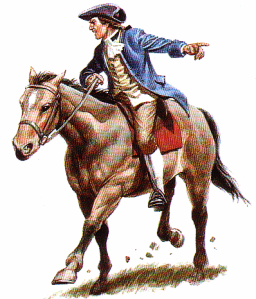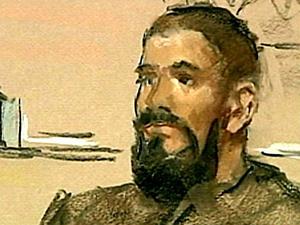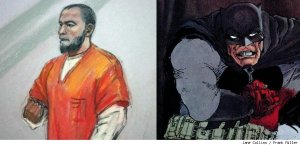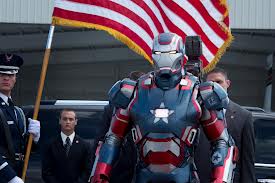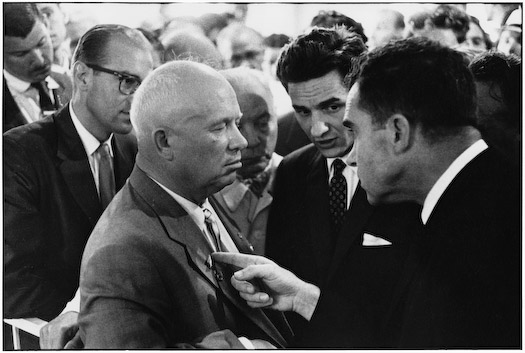Paul Revere died in 1818 and was reborn in 1861. His resurrection gave him the strength of three men and the power of bilocation: He was both in the church tower swinging a lantern and on his horse across the river receiving the message. Fellow riders, William Dawes and Samuel Prescott, stumbled and vanished into the white space between the stanzas of Henry Wadsworth Longfellow’s “Paul Revere’s Ride,” the poem that created the larger-than-life American hero. When the actual, human-sized Revere died, his obit writer didn’t even mention that not-yet-legendary midnight ride.
Paul Revere is one of several super-Americans Tarek Mehanna, a Pittsburgh-born pharmacist convicted of supporting Al Qaeda in 2012, named as his role models. Batman was at the top of the list. “When I was six,” Mehanna told his sentencing judge, “I began putting together a massive collection of comic books. Batman implanted a concept in my mind, introduced me to a paradigm as to how the world is set up: that there are oppressors, there are the oppressed, and there are those who step up to defend the oppressed.”
After Batman, school field trips and high school history classes showed him “just how real that paradigm is in the world.” He admired the oppression-fighting Paul Revere, Tom Paine, Harriet Tubman, Nat Turner, John Brown, Emma Goldman, Eugene Debs, Rosa Parks, Malcolm X, and Martin Luther King. “Everything a man is exposed to in his environment becomes an ingredient that shapes his outlook,” Mehanna explained. “So, in more ways than one, it’s because of America that I am who I am.”
Judge O’Toole sentenced him to seventeen years. Glenn Greenwald calls that “one of the most egregious violations of the First Amendment’s guarantee of free speech,” one that history will condemn along with “the architects of the policies he felt compelled to battle.” It could be a while before history makes its ruling, so meanwhile O’Toole’s stands—a panel of judges rejected an appeal last month.
Like Henry Wadsworth Longfellow, Tarek Mehanna is a writer. He supported Al Qaeda by pen rather than than sword. Longfellow was the first American to translate Dante’s Divine Comedy into English. Mehanna translated “39 Ways to Serve and Participate in Jihad” and posted it online from his bedroom in his parents’ suburban Boston home. That sounds considerably less poetic than a midnight gallop, but like his hero, Mehanna is a messenger.
“I mentioned Paul Revere,” said Mehanna, “when he went on his midnight ride, it was for the purpose of warning the people that the British were marching to Lexington to arrest Sam Adams and John Hancock, then on to Concord to confiscate the weapons stored there by the Minutemen. By the time they got to Concord, they found the Minutemen waiting for them, weapons in hand. They fired at the British, fought them, and beat them. From that battle came the American Revolution. There’s an Arabic word to describe what those Minutemen did that day. That word is: JIHAD, and this is what my trial was about.”
That’s not a definition most Americans know. The FBI, however, defines “Terrorism” as “acts dangerous to human life that violate federal or state law” and that are intended to “intimidate or coerce a civilian population” and/or “influence the policy of a government by intimidation or coercion.” There’s a Spanish word to describe that:
Zorro.
Johnson McCulley’s grasp of colonial history is even looser than Longfellow’s, but the pulp novelist knew what Americans loved: Champions of the Oppressed. Zorro waged his one-man war on the corrupt regime of Spanish California. His activities included whipping judges, disfiguring soldiers, and killing at least one military officer in open combat—all with the aim of coercing a tyrannous governor into reversing his abusive policies. Batman co-creator Bill Finger was six when The Mark of Zorro hit theaters in 1920. Finger included stills of the masked and swashbuckling Douglass Fairbanks in the scripts he handed Bob Kane to draw.
When Mehanna was collecting Batman comics in 1989, Michael Keaton was playing the caped crusader in theaters, but the paradigm was the same. “Muslims should defend their lands from foreign invaders – Soviets, Americans, or Martians,” Mehanna told Judge O’Toole. “This is not terrorism, and it’s not extremism. It’s what the arrows on that seal above your head represent: defense of the homeland.”
Whether you think Mehanna was unfairly convicted or not (my jury is still deliberating), he is a devout follower of American Superheroism. He, like many of his fellows Americans, likes things simple. He sees the world through a six-year-old’s eyes: the good guys and the bad guys they battle. That’s a black and white universe, with all the poetically inconvenient nuances dropped into the stanza breaks and panel gutters. Longfellow sacrificed Dawes and Prescott to preserve the simplicity of his heroic vision. Madeline Albright, argues Mehanna, sacrificed “over half a million children” who died due to “American-led sanctions that prevented food, medicine, and medical equipment from entering Iraq.”
The figures are contestable, but the Department of Defense considers “incidental injury” to non-military targets lawful “so long as it is not excessive in light of the overall military advantage.” So a Stanford Law School study, for example, estimates that drone attacks in Pakistan have killed up to 881 civilians, including 176 children. Such “collateral damage” differs from terrorism because the deaths, although premeditated, were not the overt goal—a distinction irrelevant to the victims.
Longfellow would leave the body count out of any poetic rendering of the War on Terrorism. We prefer our Paul Reveres heroically purified. Eugene Debs, another of Mehannna’s role models, was six when “Paul Revere’s Ride” was first published in Atlantic Monthly. Debs grew up to be a champion of oppressed laborers and was sentenced to ten years in prison under the Espionage Act of 1917 for speaking against U.S. involvement in the first World War. President Harding commuted the sentence after the war ended. Perhaps some future, post-War on Terror President will do the same for Mehanna, but I doubt it. America loves its Batman paradigm too much. It would take another Revolution to overthrow it.
[A version of this piece first appeared in the Roanoke Times on November 30, 2013.]

